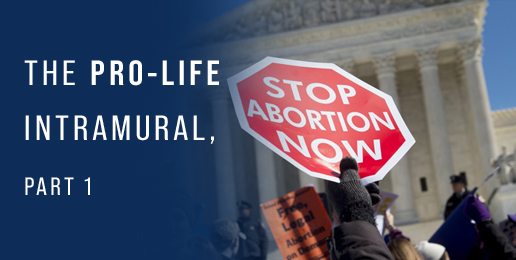
There’s a common debate that tends to pop up in pro-life circles when “partial solutions” to the evil of abortion are proposed.

Incremental pro-life moves, such as a ban on abortion after the baby is 15 weeks old, tend to draw both ire and praise from the same side of the aisle.
This is because pro-life activists exist on somewhat of a spectrum, and both ends of this spectrum recognize something true about the abortion issue. On the one hand, the abolitionists would call for a complete ban on abortions, no matter how far along the pregnancy and no matter how politically unpopular the move.
This conviction stems from a sober-minded understanding of what abortion really is and a righteously ignited passion for the lives being snuffed out daily.
Some abolitionists might even refuse to propose a 15-week ban, because it could be seen as legitimizing the slaughter of 14-week-old babies.
The more you meditate on how serious a crime abortion is, the more this position seems compelling. After all, if you lived in Nazi Germany, wouldn’t you have striven for a complete and immediate end to the death camps, instead of some gradual bill that phased them out over five years?
Or, if you were a 14-week-old baby in utero—and keep in mind that all of us were, at some point—wouldn’t you want the law to restrain anyone from taking your life no matter how unpopular it might be?
If abortion truly is murder, and if murder is always an abomination, then abortion is always an abomination.
What else could we demand from the law but total abolition?
But the other side to this spectrum recognizes an important complementary truth. Let’s call this side the prudentialists. They are likewise committed to the total abolition of abortion, but they recognize that in today’s political climate, it most likely won’t happen.
In order to get anything done, you have to know how to work the political system. Therefore, they don’t propose total bans on abortion, which would realistically go nowhere at this point. Instead, they propose small, gradual steps one at a time—a 15-week ban here, a severance of funding there, a heartbeat law here again.
These small bills can actually gain support in the moment, and they do save a marginally greater number of lives each time while laying down precedent for future, bigger steps.
The more you meditate on the stark cultural realities facing the pro-life movement in many states, the more this position might seem compelling.
You can ask indoctrinated progressives to vote to abolish their crown idol all you want; you’ll never get anywhere. Rather, history seems to play out in the prudential manner—take the great anti-slavery statesman William Wilberforce.
Try as hard as they might, the British statesman was not able to abolish slavery in his country in one fell swoop. Instead, he worked within the unfortunate confines of his political environment, taking gradual steps to chip away at the institution of slavery while building societal acceptance and political momentum for his cause.
Eventually, the right moment came for complete abolition, but there were many intentional small steps that were necessary to get his nation to arrive—decades after he started the good fight.
And so, the stage is set.
Abolitionists might accuse the prudentialists as cowards who are so focused on building political consensus that that they don’t actually value lives enough to save them immediately.
And prudentialists might accuse the abolitionists of being naïve zealots who are so blinded by righteous rage that they are constantly chasing the pie in the sky without climbing the ladder that’s necessary to get there.
What are we to make of all this?
We’ll continue this discussion in Part 2.























